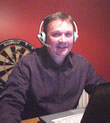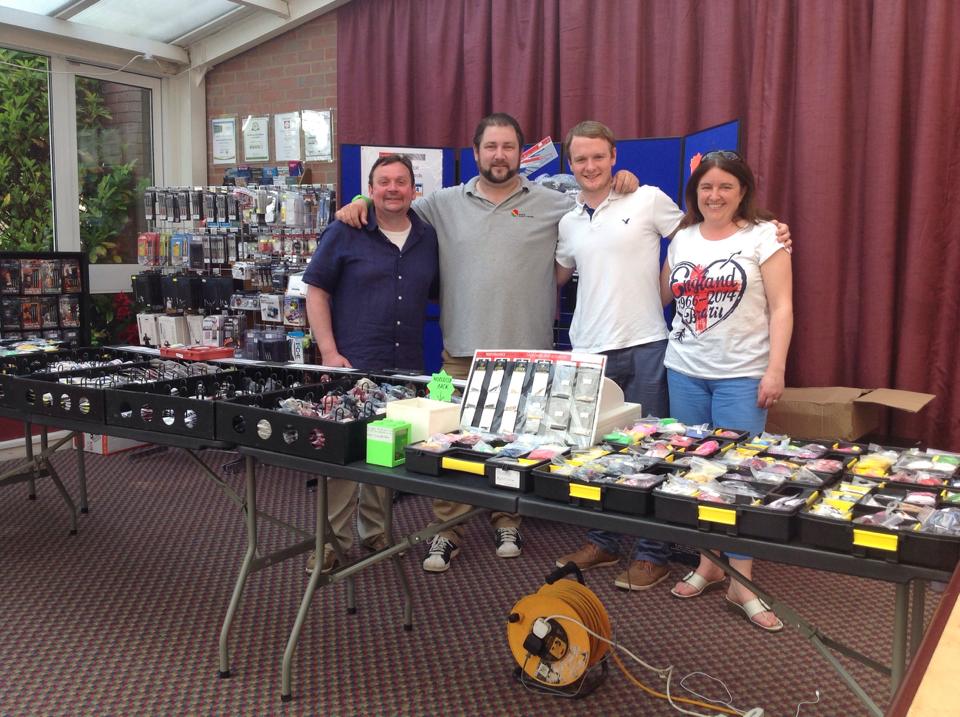Interview with Paul Gillings
Paul Gillings is the founder of the Darts Performance Centres - a Dart Coaching Internet site. For an annual fee of 25 pound one gets tips and suggestions, can piece together a customised practice and can play interactice practice games. Gillings and his colleagues will give you the necessary and helpful feedback. Beside the Darts Performance Centre offers video analysis of the throw - online or in the coaching rooms of the Darts Performance Centres or even mobile during tournaments or special coaching events. Part of the Darts Performance Centre is an own Online Shop, which by now can be found as a Pop Up Shop at dart tournaments as well.

We once talked before the Darts Performance Centre was founded. It has existed now for several years - would you say it is a success?
Success can be measured in many ways. Three years ago darts coaching in the UK was never talked about! Three years on we have met and coached hundreds of players with our video kit, we have members from all over the world signed up to our website and thousands more who read our coaching blogs. We also had members fly over from Canada and Ireland for our annual members' coaching night, this year we have one already booked in from Germany ? So I think we have been very successful in getting dart players of all standards to think a bit more deeply about their game.
And did it turn out as you expected?
I didn't really have a totally fixed idea of how things may turn out. The sale of our own Performance Darts range for example has been a great success as have our online darts sales in general. I didn't envisage this side of our business would have had such a big impact as it has. But, this income has been vital in helping us keep the website going and being able to acquire the offices we have with our own dedicated coaching room.
As you originally were more a football expert what have you learnt about darts over these last years?
Footballers and dart players have the same goals, they both want to win and they both want to improve, so in that area there was no difference. I have also learned a lot about dart players' personalities and attitudes which can differ a lot from grassroots to professional level. Then there are those who just want to have fun and those who really want to progress. And of course I learned a lot about darts from my colleague, Andy Humphrey, who is a dart player himself and has been for over 30 years. He has taught me very well on the technique side of the game, sitting alongside him whilst looking at the techniques of hundreds of players has been a great learning curve for me. It is crucial to know about every aspect of darts to make the DPC work!
Would you say from your experience now that the PDC is the top level?
It certainly is the level aspiring players seem to want to play at but the BDO plays a very significant part in darts all over the world.
What would you say the sport of darts has in common with other sports?
As in other sports the governing bodies are professional and I really mean both governing bodies. I have some insight into the BDO as well and it is run as professionally as the PDC even when it's hard to recognize in those tournaments where 500 players turn up to a BDO event whereas PDC tournaments usually have just the two players on stage at a time. The other similarities are that to improve you need to practice, you need to be physically fit, you need to be dedicated, single minded as well as open minded.

And are there things quite unique to the sport?
The alcohol before and during the tournament immediately comes to mind. You won't find that in any other sport. Furthermore there is no formal coaching structure in place. This is an issue as players grow into the game believing that coaching is something alien to them. In all other sports young players are coached from the very start and it becomes the norm for them. This is something that needs to be addressed in darts in the UK urgently!
What from your experience are the most widespread problems dart players have to fight with?
Those are the nerves! That is always more a problem in solo sports. In a team sport you at least have a team around you which helps to settle the nerves. A lot of players try to solve it by just playing on and on - which is no solution in the end.
Are there problems which would need a head to head meeting with the players?
I think any problems are best dealt with head to head. We have had some tremendous success and feedback from 'live' coaching and video analysis and we have also done video analysis entirely online. But on occasions I have watched the video and would have loved the chance to meet the player and be able to work with him.
You offer video analysis as well - would you recommend the combination of video analysis and DPC?
The video analysis is a real eye opener for dart players. Some really can't believe what they are seeing, silly mistakes they have been making for years. This service gives them the chance to correct it. The DPC then covers all the other parts you need to really master darts, the psychology, goal setting, practice games and nutrition.
Is it a problem to convince dart players of the impact sports science methods can have on their performance?
Yes it can be. Most of the players have no experience of any coaching in any sport, so there can be resistance from some. I have heard that some of the top pros are using the services of qualified sports psychologists and others are using hypnotherapy type services. So that is an interesting development.
Is it more difficult to convince the amateurs or the pros?
That's something else which surprised me - it is certainly much more difficult to convince the pros.
Would you think the "young generation" is more responsive to topics like sports science and sports psychology?
I am not sure yet but it looks like it. This might be because it is talked about much more and more is published about it nowadays.
From your point of view what are widespread faults of dart players?
Well, the techniques, not aiming and "bad" practice. I think often enough the technique is faulty and I am still astonished how many players don't aim at all. And of course the practice often is not really doing what practice should do, which is progress your skill level. Pounding darts for hours at the board is not going to do that. We advocate structured practice sessions that relate directly to what actually happens in a darts match and also focus on areas that a particular player needs to work on.
When you watch the top players, would you say they are less "faulty" than other players or how can you explain their bigger success?
I think in the end it is that they really have the better technique together with a lot of experience. When you watch them closely even though the techniques differ they do all the same thing - an accurate follow through for example or a repeatable throw they really replicate accurately every time.
Do you sometimes think when you watch them: if you change this or use that or work at this you could be even better?
Very often - there are still faults but those are not really grave. There are other areas they could work at as well though, attitude for example or physical fitness, sometimes the oche position (for example Ted Hankey who stands at one side of the oche). Decision making is overlooked in darts, players repeatedly making the same mistake. There is one player for example (I won't name him) who frequently makes the same mistake with his third dart! I could make him an extra 20 or 40 points, maybe more a leg by pointing out his error, that could be the difference between winning the leg and losing it.
What would be the right attitude for a top player ? In what way could it be improved?
I think you don't need to look any further than The Power. He is totally dedicated to the sport, he has a desire to win, he is open minded about his training and his kit and will try anything if he thinks it may improve him even a fraction.
What is the right approach to losing? And how can you benefit from it?
If you lose, ignore your friends and fans, that is my advice. They will tell you that you were unlucky, that it will all come good and it is just a blip! That is nonsense. All that does is mask the true reason for you losing the game. If you lose make the most of it. Investigate how and why you lost. Learn what you can change next time, what you need to practise to make sure you give yourself a better chance in the next game. It all comes back to feedback again, losing is the most blunt form of feedback, the skill is then finding the culprit or culprits for your defeat then work on banishing them from your game!
Is it an advantage to start young playing darts? And would you say different kinds of practice for different age groups are necessary?
It is always and in every sport an advantage to start young. It just needs hours and hours of practice to get really good. But you wouldn't need different kinds of practice for different ages, only for children perhaps. For them it might be helpful to adapt the oche length and the height of the board.

How much would you think is talent in a top dart player and how much hard work?
I myself don't really believe in this often mentioned innate natural talent. To get to be a top player you need a lot of hard work, a lot of dedication and a lot of willpower.
Do you see any natural limits in the "How good can one get"?
Well, no - though I can't imagine it will happen that players will only throw perfect legs - nine-darter after nine-darter. But over the years the standard has got higher and higher. Better equipment of course has helped too.
Can one be too old to play good darts?
It is more that old dart players experience the same old age problems as other people. But you can't be too old to play good darts. All restrictions I can imagine would be conditioned by normal signs of old age.
What from your experience is the difference between female and male dart players and why do you think female players don't seem to be able to perform on the same level as the male players?
That is a very good question. I can't see darting abilities have anything to do with gender or the body - there is nothing that qualifies men in particular. Perhaps it is more a question of women getting the same amount of time to play and practise. Another possibility is that men start younger and build up their skill levels over a longer period. The biggest challenge women's darts faces is attracting young girls to play the game and then keeping them in the system. There are some high quality women players out there now and they are also fantastic role models, Deta Hedman, Anastasia and Lisa Ashton for example. The younger girls such as Fallon Sherrock and Casey Gallagher are also a great advert for women's darts and getting the youngsters playing and staying is the key to bridging the gap between men and women on the oche.
The DPC has a three stage approach to the sport - there is technique, the mental and psychological aspects and the fitness/nutrition part. Are all three parts equally valid?
I am convinced that all three parts are equally valid.
Is good practice part of developing a solid technique?
You need a special type of practice to develop a solid technique, there are many different areas but each can be practised individually and then all brought together - something the DPC offers as well.
Would you say a player can do it all alone or would a coach be a better option?
It would be much better to have a coach but most players believe they are totally capable of sorting things out themselves. I am convinced this will change over time. Feedback is the key to learning and improving-you cannot get objective feedback from your fans or your driver or sponsor.
Is the always mentioned mental strength something you can learn?
Yes, I would say so. Experience is an essential part of it, building up confidence is another. And what I think is very important is the right approach to losing.
What really is "mental strength""?
I define it as total belief in your own ability and the ability to handle all distractions and the strength to never ever give up!
Do you believe luck plays a part in being successful? Does the "lucky" win or the "unlucky" defeat really exist?
Not in darts. I don't believe in "lucky darts" or "lucky wins" There is a reason for every defeat. It's vital to think about it and to find that cause of the loss. That's what pushes you forward not when you say, I just had no luck today.
The third part of the DPC is about fitness and nutrition. In what way is physical fitness a benefit in darts?
I think a dart player benefits from it in the same way as every sport: he will have more stamina, he will feel more comfortable and he will be more in form beside other things.

And would it be beneficial as well to follow some kind of healthy diet?
That certainly is a problem during the tournaments. Just look around here in the venue. There is nothing at all you could call "healthy". You only get pizza, burgers, pasties and similar food. So in the end you would have to bring your own food.
Many of the top players drink alcohol before the matches - what would happen if alcohol was banned?
It's still a popular misconception that alcohol helps. Half a pint is what is proved to settle the nerves. As darts is a precision sport more alcohol tends to harm and not to help. It even might change your technique. Though of course one has to say that the some players are used to drinking much more than half a pint.
If alcohol was banned? Well that would be interesting! But like any rule change players would adapt and after time it would be the norm.
What is your idea about darts and alcohol? And how will it pan out?
I would not recommend it. All it does is add another variable that could go wrong. There are many other ways to combat nerves other than alcohol. And I can imagine it might happen soon that alcohol is banned.
Part of the DPC is the Shop where you offer quite a range of tools. Can tools and equipment really help you to become a better darts player?
Certainly I believe more in the skill and think it takes many years to get to the top and those top players will always be a minority. But what I offer in the shop is all tested and proven to be effective.
When you look at those PDC top players who seem to experiment quite a lot with the equipment - is that helpful?
It could help and one should stay interested. But when you have found what works for you, you should stay with it and look for other reasons for any problems.